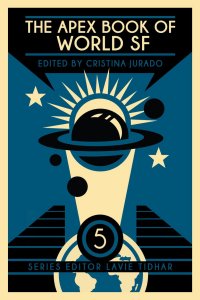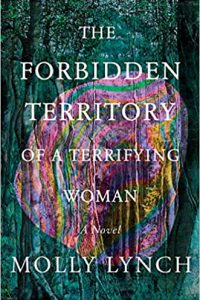Paul Di Filippo reviews The Apex Book of World SF 5, Edited by Cristina Jurado & Lavie Tidhar
The Apex Book of World SF: Volume 5, Edited by Cristina Jurado & Lavie Tidhar (Apex, $16.95, 359pp, hardcover) October 2018
 It can be convincingly argued, I believe, that the expressed genuine interest of the English-speaking SF audience in foreign science fiction is exactly coterminous with the birth of the genre. For did not the very first issue of Amazing in 1926 feature work by Jules Verne? Yes, that’s a jiggered statistic, an outlier and an exception concerning the availability of foreign SF in the English-language marketplace. Generally speaking, audiences who have English as their primary language are woefully underserved by available translations. But why should SF readers be any different than those of other genres, including literary fiction? A 2015 article from The Daily Beast, “Why Americans Don’t Read Foreign Fiction,” gives us the sad story. “Three Percent, a resource for international literature at the University of Rochester, derives its name from the fact that about 3 percent of all the books published in the U.S. every year are translations. But the bulk of these are technical writings or reprints of literary classics; only 0.7 percent are first-time translations of fiction and poetry.”
It can be convincingly argued, I believe, that the expressed genuine interest of the English-speaking SF audience in foreign science fiction is exactly coterminous with the birth of the genre. For did not the very first issue of Amazing in 1926 feature work by Jules Verne? Yes, that’s a jiggered statistic, an outlier and an exception concerning the availability of foreign SF in the English-language marketplace. Generally speaking, audiences who have English as their primary language are woefully underserved by available translations. But why should SF readers be any different than those of other genres, including literary fiction? A 2015 article from The Daily Beast, “Why Americans Don’t Read Foreign Fiction,” gives us the sad story. “Three Percent, a resource for international literature at the University of Rochester, derives its name from the fact that about 3 percent of all the books published in the U.S. every year are translations. But the bulk of these are technical writings or reprints of literary classics; only 0.7 percent are first-time translations of fiction and poetry.”
From time to time, SF editors and writers have tried to remedy this situation. Isaac Asimov brought us some volumes of Soviet SF in the Sixties. Damon Knight did likewise with some French tales. Frederik Pohl actually launched a magazine with globalist aspirations around this time, International Science Fiction. DAW books later brought out some German and French fantastika. Stanislaw Lem and the Strugatsky Brothers were always well-received anomalies. But it was not until the twenty-first century and the birth of the internet that translated work really began to proliferate, and with the success of such writers as Cixin Liu lately, it seems that the goal of bringing SF from the non-English-speaking world to those fans conversant mainly with the products of the USA, England, Canada and Australia is unstoppable.
Certainly the series of Apex World SF anthologies founded by Lavie Tidhar has been highly instrumental in broadening our sense of what’s going on around the planet. Tidhar edited the first three books solo, then, while maintaining high-level duties, turned over responsibility for compiling volume four to Mahvesh Murad. The latest installment, put together by Cristina Jurado, continues the series’ valuable tradition of horizon-broadening, while providing great entertainment besides.
Two things to mention before diving into the tales themselves. Some were written directly in English, while others were translated. All the translations struck me as highly competent, graceful, and admirable. Second, I’ll use the country of origin designations from the TOC in parentheses, to convey the range of these selections.
We get a stimulating Bruce-Sterlingesque foray into the future of 3-D organic fabricators with “A Series of Steaks” from Vina Jie-Min Prasad (Singapore). Two clever women play the market for illegal luxury meats, risking life and reputation for a big score. An Addams Family vibe inheres in the atmosphere of “Accursed Lineage” by Daína Chaviano (Cuba). (“I don’t like old blood!” one of my siblings complains.) Producing fine frissons, Darcie Little Badger (USA/Lipan Apache) explores supernatural rifts in “the fabric between Here and Below” in “Nkásht íí.” In “Ghostalker” T.L. Huchu (Zimbabwe) shows us that “you’ve got to be careful when you deal with the dead.” Fans of Tim Powers’ spook tales will find much to admire here.
Taiyo Fujii (Japan) offers cyberpunk thrills in “Violation of the TrueNet Security Act,” giving us a hero whose job is zombie hunting. But these zombies are “orphan Internet services.” “Ambiguity Machines: An Examination” hails from the well-known Vandana Singh (India), and consists of three stirring and emotionally vivid fables regarding “impossible machines.” Can the ultimate Autocrat issue a ruling that reconfigures even Death? That scenario is explored in “Scenes from the Life of an Autocrat” by Basma Abdel Aziz (Egypt). One gets some of the same flavors as in Karin Tidbeck’s Amatka.
Liliana Colanzi (Bolivia) explores the harrowing ordeal of early Martian colonists–in a fix somewhere between the visions of PKD and Stan Robinson–in “Our Dead World.” Exterior circumstances begin to conform to interior geographies of sorrow. Although “An Evolutionary Myth” by Bo-young Kim (South Korea) begins its narrative sounding like a purely imaginary fairy tale, the discerning reader soon realizes they are dealing with an outré far future where the human form undergoes Ovid-like metamorphoses. A ragged survivor named Albot, wandering through a postapocalyptic landscape, struggles to recover his memories, with consequences for all of civilization, in “You Will See the Moon Rise” by Israel Alonso (Spain). Nice surreal episodes alternate with grim and gritty realities.
Sara Saab (Lebanon) delivers a nightmare of bioengineering paranoia in “The Barrette Girls,” melding Richard Calder with Matthew de Abaitua. A bold and startling premise underlies one of my favorite stories herein, “The Calculations of Artificials” by Chi Hui (China). To rescue a rebuilt civilization from humanity’s innate bad nature, the world is seeded with many many Artificial people, leaving the few Actual (baseline) humans separated from their triggering rivals. Our hero, Aixia, is one of the controllers who knows the real deal and is tasked with monitoring the system. But when he begins to have his doubts, he finds the establishment turning against him. Reminiscent of Leiber’s You’re All Alone, the tale is both utopia and dystopia at once.
Ana Hurtado (Venezuela) evokes a haunting and haunted landscape of poverty and promise, infused by the anguish of a young girl named Ana, in “El Cóndor del Machángara.” Ana’s desires for harmony with her world eventually summon up deities and wonders. In “Alone, on the Wind,” Karla Schmidt (Germany) depicts the harsh life among the gravitically fluctuating “Dancing Stones,” and the plight of one tribe member who cannot accommodate to the demands of the strange environment. Echoes of Tiptree and Fran Wilde’s Bone Universe series pervade. With Clive Barkerish touches, Eliza Victoria (Philippines) delivers an allegory of growth through dissolution in “The Seventh.”
“Entire souls encased in folded paper.” That’s the deadly weapon that a father-son team of homicide cops has to battle in the hardboiled “Screamers,” from Tochi Onyebuchi (Nigeria/USA). R.S.A. Garcia (Trinidad and Tobago) conjures up some truly alien aliens in “The Bois,” and tackles with fresh insights that age-old SF trope of human colonial intrusion and the misunderstandings that ensue. Lastly, the masterful and touching “Ugo” by Giovanni De Feo (Italy) deals with love, free will, predestination and time travel in a sharply mimetic contemporary way.
After marveling at the deftly hewn and highly idiosyncratic wonders presented here, it’s possible to make a few observations in general. First is that the careers and accomplishments outlined in these author biographies represent impressive CVs equal to those attached to many better-known names here in the Anglosphere. There are many rich publishing ecologies of science fiction around the world.
Second, and more importantly, the ultimate effect of this volume–at least on me–is to convey a sense of the universality and commonality of fantastika, rather than any sense of separateness, of isolation or pocket universes creating exotic Shangri-las. Science fiction in particular is a utilitarian globalist toolkit which–whether in the hands of an American or a South African, a Russian or a German or a Latinx author–produces much the same kind of story. Yes, there are many ethnic overlays in these tales, cultural trappings and traits which only citizens of other nations could authentically replicate. Also we find some differing perspectives on power structures and life goals. But not any deeper variations than one would uncover, I think, within a single country, along a spectrum of native writers. If it’s not too rude and audacious a thought experiment, imagine that you came, unwitting, to “The Barrette Girls” and found it bylined as by Kathe Koja. Or you read “The Calculations of Artificials” under the name of Geoff Ryman. Or maybe you encountered Jeff Ford’s “Ambiguity Machines: An Examination.” Even a savvy reader might accept that these talented and wide-ranging English-language authors had produced such uncanny, estranging tales–as indeed they already have demonstrated they can do.
In other words, the authors collected here stand shoulder-to-shoulder in a shared mutual endeavor with their English-speaking counterparts, rather than being seen metaphorically as satellites around some massive planet, or entirely distant other worlds with no parallel evolution or sympathies.
That’s a status, if such indeed it be, that this series of anthologies has both helped to foster and now represents with pride.
 While you are here, please take a moment to support Locus with a one-time or recurring donation. We rely on reader donations to keep the magazine and site going, and would like to keep the site paywall free, but WE NEED YOUR FINANCIAL SUPPORT to continue quality coverage of the science fiction and fantasy field.
While you are here, please take a moment to support Locus with a one-time or recurring donation. We rely on reader donations to keep the magazine and site going, and would like to keep the site paywall free, but WE NEED YOUR FINANCIAL SUPPORT to continue quality coverage of the science fiction and fantasy field.









Thanks for such an interesting review. Although I have to point out that I had no idea who the Addams Family was when I wrote “Accursed Lineage”. This story was written when I was still living in Cuba. It was meant to reflect, in a darkly ironic way, the fear and hunger we experienced daily in my country.